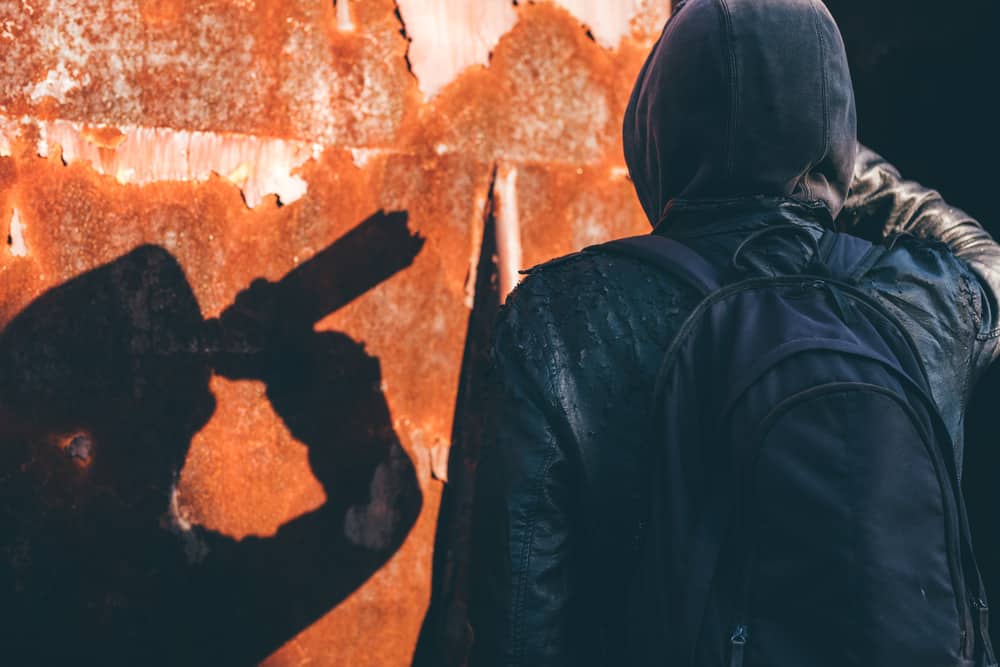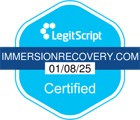Spotting Addiction in Loved Ones
Is My Friend Addicted?
One of your closest friends has started to act a little strange. Maybe they have been distant for a while and have pushed away the people they used to enjoy spending time with. Maybe they have been showing up to work late and disheveled — maybe they have stopped showing up entirely. Whatever the case, you have noticed something is definitely amiss. You start to suspect your friend might actually be struggling with drug or alcohol addiction. But how can you be sure? At Immersion Recovery Center we know just how painful it can be to watch a loved one struggle with a substance use disorder. You might be afraid to confront your friend for fear of pushing them even farther away. We are available to help walk you through the process of helping a loved one who has been struggling with addiction. There are steps you can take to help — continue reading to learn more, or reach out to us directly over the phone or through our website and we will answer any additional questions.
How Can You Tell if Your Friend is Experiencing Drug & Alcohol Addiction?
How can you tell if your friend is struggling with addiction or if they’re simply going through a short-term slump? As human beings, we experience a series of emotional highs and lows — no one is happy and fun-loving all of the time. However, if your friend has been acting out-of-character for a prolonged period of time and you have a sneaking suspicion something more sinister is the root cause, there is no harm in taking extra steps to be sure. There are several ways to tell if your friend is experiencing drug and/or alcohol addiction. You can look for physical, emotional and behavioral warning signs. You can keep an eye out for drug and alcohol paraphernalia. We have compiled a list of ways to tell whether or not your friend is struggling with addiction, and if you have any additional questions regarding this subject (or any other addiction or recovery-related subjects) we are happy to help — contact us today to learn more.
We Are Here For You
Let Us Help You Heal
Our detoxification experience is second to none.
Learn how we can help by speaking with one of our Treatment Advisors today.
Physical Signs of Addiction
One way to tell whether or not a close friend is struggling with an addictive disorder is by looking for the physical signs of addiction. Physical signs and symptoms vary significantly based on the type of substance being misused. For example, someone who is grappling with an alcohol use disorder is going to behave very differently than someone who is using methamphetamine. We have laid out several examples of telltale physical signs of addiction; you are welcome to contact us directly with any additional questions you might have.
Physical Signs of Alcohol Use Disorder
The most common physical signs and symptoms of an alcohol use disorder include:
- A lack of attention paid to personal hygiene.
- Noticeable weight loss or weight gain.
- A lack of coordination/an inability to stand or walk straight (signs of intoxication).
- Strange bruises and injuries.
- Flushing of the face/redness in the cheeks and nose.
- Regularly upset stomach.
- A yellowish skin tone, resulting from jaundice (caused by liver damage).
Physical Signs of Opioid Use Disorder
The most common physical signs and symptoms of an opioid use disorder include:
- Noticeable weight loss.
- A lack of attention paid to personal hygiene.
- Frequent development of flu-like symptoms (upset stomach, runny nose, headaches).
- Excessive and uncontrollable yawning.
- Nausea and vomiting.
- Appearing to fall asleep or move in and out of consciousness.
- Changes in sleeping patterns/excessive drowsiness throughout the day.
Our Treatment Services Include
Physical Signs of Benzodiazepine Use
The most common physical signs and symptoms of a benzodiazepine use disorder include:
- Extreme drowsiness and tiredness throughout the day.
- Slurred speech/a lack of control over basic motor functions.
- Loss of appetite.
- Nausea and vomiting.
- A lack of coordination, which can be due to dizziness or vertigo.
- Body tremors/uncontrollable shaking.
Physical Signs of Stimulant Use
The most common physical signs and symptoms of a stimulant use disorder include:
- Restlessness/an inablity to sit still.
- Decreased appetite, which often leads to noticeable weight loss.
- Rapid heart rate and elevated blood pressure.
- Increased excitability and nervousness.
- Increased talkativeness.
- Skin problems, like scabs, sores or abscesses.
- Dental problems (commonly associated with methamphetamine use).
Emotional & Behavioral Signs of Addiction
A person who has been struggling with substance use will also exhibit emotional and behavioral signs. These signs also vary on a person-to-person basis, though there are often some similarities across the board. If you believe your friend might be struggling with a drug or alcohol addiction, keep an eye out for:
- Obvious changes to mood and demeanor.
- A loss of interest in activities which were previously enjoyed.
- Isolation from friends and family/more time spent alone.
- Defensiveness when substance use is brought up in conversation.
- Increased or newly developing symptoms of anxiety and/or depression.
- Changes to sleeping and eating patterns.
- Experiencing problems at work or at school.
- Missing out on personal obligations or important engagements.
- Experiencing issues in interpersonal relationships.
- Decreased motivation.
- Legal and financial problems directly related to substance use.
Ready To Begin Your Treatment?
Let Us Help Your Family Heal
Our family therapy program is second to none.
Learn how we can help your family by calling a Treatment Advisor now.
Paraphernalia Can Be a Sign of Addiction
If you believe a close friend might be struggling with alcoholism or drug addiction, the presence of certain types of paraphernalia can be a good indicator. Many people who struggle with addiction stash their paraphernalia out of sight, and while rummaging through your friend’s personal belongings can be an invasion of privacy it is a good idea to keep an eye out for telltale signs of substance use. If you suspect your friend has been misusing prescription medications, for example, you probably want to avoid sifting through the contents of their backpack or tearing through their closet. However, taking a peek inside of their medicine cabinet for excessive pill bottles might help confirm an addictive disorder is present. If you do find drug or alcohol paraphernalia in your friend’s personal belongings, avoid confronting them immediately. Take time to consider how you will approach the conversation. We recommend reaching out to someone with professional experience for advice on how to handle the situation. At Immersion Recovery Center we are available to help in any way possible.
Alcohol Use Disorder Paraphernalia
Someone who has been struggling with an alcohol use disorder might have the following paraphernalia:
- Empty or full alcohol bottles stashed in the trash and in other places throughout the house, like bathroom cabinets or the bedroom closet.
- Brown paper bags (used by liquor stores to conceal alcohol).
- Empty water bottles or soda bottles that smell like alcohol.

Opioid Use Disorder Paraphernalia
Someone who has been struggling with an opioid use disorder might have the following paraphernalia:
- Multiple painkiller prescriptions or pills stashed in other places (visit this website for prescription painkiller identification).
- Pill residue on household surfaces (some people who abuse prescription painkillers crush the medication so it can be ingested nasally).
- Heroin paraphernalia, which might include needles and syringes, small plastic baggies or pieces of wax paper, burnt spoons, torn up cotton balls or q-tips, rubber tourniquets and cigarette lighters.
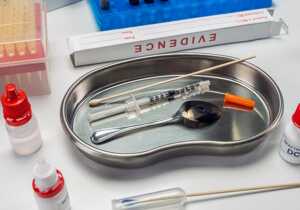
Benzodiazepine Paraphernalia
Someone who has been struggling with a benzodiazepine use disorder might have the following paraphernalia:
- Multiple prescription pill bottles.
- Random pills stored throughout the house (in medicine cabinets, bedside tables, under the bed, in the closet, etc.)
- Pill residue on flat surfaces/razor blades used to cut up pills into a fine powder.
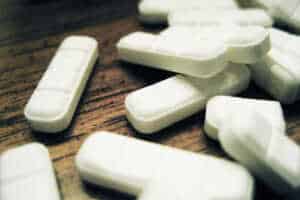
Stimulation Paraphernalia
Someone who has been struggling with a stimulant use disorder might have the following paraphernalia:
- Small glass pipes used to smoke methamphetamine or crack cocaine.
- Burnt pieces of tinfoil and cigarette lighters.
- Small plastic baggies of powdered cocaine.
- White powder residue on flat surfaces/mirrors, credit cards, razor blades.
- Rolled up dollar bills or straw fragments.
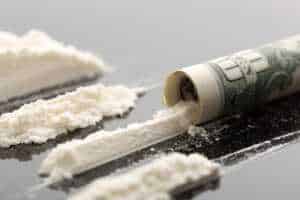
Begin Healing Now!
Have A Call With One Of Our Treatment Advisors
Don’t Suffer Any Longer
How to Help a Friend with Addiction
If you have noticed warning signs and seen paraphernalia, you might be wondering what steps to take next. How can you help a friend who is clearly struggling with addiction? At Immersion Recovery Center, we recommend educating yourself on addiction first and foremost. This will help you come from a place of compassion and understanding rather than frustration. You might want to shake your friend by the shoulders and scream, “What are you doing with your life?!” However, approaching the matter with a calm, collected and sympathetic attitude will increase the likelihood of your friend seeking professional help. We recommend taking the following steps when dealing with an addicted friend:
- Get Informed – Knowing what signs and symptoms to keep an eye out for is a great place to start. Next, educate yourself even further on addiction. What are the best treatment options? Is inpatient rehab always necessary? You are welcome to contact us directly with any questions you might have.
- Have a Conversation – Set up a time to sit down with your friend and have a calm and non-accusatory conversation. Be sure your friend is completely sober at the time, and address your concerns in a neutral environment. Because people who struggle with addiction often experience some degree of denial, be prepared for the conversation to end abruptly. At the very least an important seed has been planted.
- Present Treatment Options – If your friend does agree to have a conversation it is a good idea to present potential treatment options. Rather than bombarding them with possibilities, find one or two detox and treatment centers in your area and give them the name and website so they can do their own research.
- Take Care of Your Own Needs – Watching someone you care for struggle with addiction will do a number on your own mental and emotional well-being. We suggest attending a support group like Al-Anon or seeing an individual therapist with a personal background in substance use.
- Stage an Intervention if Necessary – If your loved one is a direct threat to themself or other people, an intervention might be a good idea. For example, say your loved one has already overdosed on heroin more than once, or they regularly get behind the wheel of a car while intoxicated. When you suggest recovery, they scoff and grow defensive. In cases like these a professionally staged intervention can prove beneficial.
- Prepare for Any Outcome – A one-on-one conversation and a professionally staged intervention might not have the ideal outcome straight away. However, once the seed is planted the likelihood of your friend reaching out for help eventually increases significantly.
Contact Us Today to Learn More
If you would like to learn more about helping a friend who has been struggling with addiction, contact us today. Many of our Treatment Advisors have been through the recovery process themselves or have helped a loved one enter treatment. We are available to guide you through every individual step of the process from start to finish. All you have to do is reach out for help and we will take care of the rest. At Immersion Recovery Center we believe addiction recovery is a viable possibility for everyone, regardless of how severe a substance use disorder has become. Contact us today to begin.
Get Started Now
Give us a call 24/7
(888) 693-1604

Reviewed for accuracy by :
Susan Shirley
LMHC
Serving as the Inpatient Clinical Director at Immersion Recovery Center, Susan will work directly with staff members, clients, and family members to ensure the clinical program remains as effective and individualized as possible. Susan is no stranger to the fields of behavioral health and addiction. She has over 25 years of experience, working in an inpatient setting, an outpatient setting, acute stabilization and nearly all other settings in the realm of addiction recovery.


